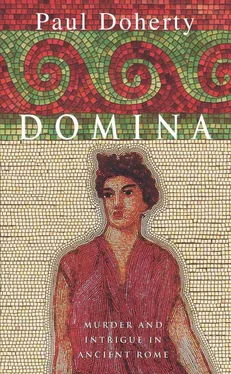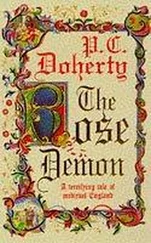Paul Doherty - Domina
Здесь есть возможность читать онлайн «Paul Doherty - Domina» весь текст электронной книги совершенно бесплатно (целиком полную версию без сокращений). В некоторых случаях можно слушать аудио, скачать через торрент в формате fb2 и присутствует краткое содержание. Год выпуска: 2012, ISBN: 2012, Издательство: Headline, Жанр: Исторический детектив, на английском языке. Описание произведения, (предисловие) а так же отзывы посетителей доступны на портале библиотеки ЛибКат.
- Название:Domina
- Автор:
- Издательство:Headline
- Жанр:
- Год:2012
- ISBN:9780755350490
- Рейтинг книги:3 / 5. Голосов: 1
-
Избранное:Добавить в избранное
- Отзывы:
-
Ваша оценка:
- 60
- 1
- 2
- 3
- 4
- 5
Domina: краткое содержание, описание и аннотация
Предлагаем к чтению аннотацию, описание, краткое содержание или предисловие (зависит от того, что написал сам автор книги «Domina»). Если вы не нашли необходимую информацию о книге — напишите в комментариях, мы постараемся отыскать её.
Domina — читать онлайн бесплатно полную книгу (весь текст) целиком
Ниже представлен текст книги, разбитый по страницам. Система сохранения места последней прочитанной страницы, позволяет с удобством читать онлайн бесплатно книгу «Domina», без необходимости каждый раз заново искать на чём Вы остановились. Поставьте закладку, и сможете в любой момент перейти на страницу, на которой закончили чтение.
Интервал:
Закладка:
Not being superstitious, I decided it was only a matter of logic. Since no one would dare draw a dagger, or so I thought, against the daughter of Germanicus, and poison was ruled out, Agrippina’s death would have to appear an accident. I took matters into my own hands. I patrolled the garden at night, checked doors, paid out money for information to the pedlars and tinkers who wandered the roads.
Antium became busier as the weather improved and the people left the city to take the sea breezes. Our next visitor was that doddering old fool, the banker Quintus Veronius with his balding head, perpetually dripping nose and eyes which looked as if he never stopped crying. He’d made a fortune in the Egyptian corn trade and spent most of his wealth raising peacocks. He’d once made the mistake of inviting Caligula to dinner. Our madcap Emperor arrived and spent most of the evening shooting at the birds from a balcony. The peacocks died and Veronius had a nervous breakdown. He’d retired to Campania and spent his life in mourning until Caligula’s murder. Veronius was a fool, who could be used by anyone. He arrived at the villa in his cumbersome litter as if it was a chance visit, but of course, he’d been sent deliberately. The news he brought only delighted Agrippina further.
‘Oh yes, oh yes.’ Veronius slobbered over his wine. ‘The Emperor, Augusta, is full of your praises. He’s banished two actors from Rome for their lying attacks on your Majesty.’
‘And Poppea?’ I asked wearily.
‘She’s seen less and less. There is news,’ Veronius continued, ‘that Nero is to visit Baiae.’
Every wrinkle disappeared from Agrippina’s face, which became as smooth and creamy as that of a young girl.
‘He’ll visit me,’ she murmured, ‘or he’ll invite me to his villa. You wait and see.’
Veronius continued his journey and Agrippina’s preparations became more frenetic. At last it happened. A bireme arrived on the coast. Officers of the Praetorian Guard marched up the shingle, along the white, dusty trackway and presented themselves at the main door of the villa. They delivered their invitation. The Divine Augustus, Nero, Emperor of Rome, intended to celebrate the feast of Minerva in his imperial villa at Baiae, and he wished Agrippina, ‘the best of mothers’, to be his honoured guest. If I hadn’t stopped her, Agrippina would have kissed them to death. Both officers stayed with us overnight, saying that the bireme would take Agrippina and her household across the bay the next day.
The villa was transformed: servants scurried about; chests and coffers were packed and taken down to the beach. Agrippina emptied her wardrobe, fiercely debating with Acerronia which shoes she should wear, which dress would best suit the occasion.
I travelled lightly, taking just my tunic, sandals, sword, writing implements and a small casket which carried antidotes to the best-known poisons. I also sought the company of the two Praetorians. Former centurions from the German legions, they were only too pleased to be away from the court and to sample the best wine from Agrippina’s cellars whilst sunning themselves in the garden. I introduced myself and let it be known that my father had been an officer in the Second Augusta. For a while we chatted. They were honest men, more interested in fighting, women and wine than in court scandal. Nevertheless, I picked up something: they found it hard to look me in the eye, and if I mentioned Poppea they became tight-lipped. When I reminded them that Agrippina was the daughter of the great Germanicus, they looked away, as if more interested in the flowers and herb plots. I had learnt enough. These men were not party to any plot but they had ears, quick wit and could sense the undercurrents of the court. I returned to the villa and urged Domina to be careful. Agrippina, however, was at her most stately.
‘Parmenon, you are like an old fishwife!’ she snapped. ‘The Emperor has come to Baiae. My son has returned.’
‘It could mean your death!’ I hissed.
Agrippina strode across, shut the door and returned with her eyes blazing. She stood only a few inches away from me. I could smell the herbs she used to sweeten her breath and noticed how the wine had purpled the corner of her lips.
‘I don’t care, Parmenon. If I die in his arms that’s enough for me. Do you understand?’
It was what I had always suspected. Agrippina loved Rome and power, the adulation of the legions, the right to appoint and dismiss, to grant life or death. Nero, however, she loved above all.
We left late that afternoon. Our slaves carried our baggage down to the beach where the marines were camped. We were taken out to the boat and, sails unfurled, the bireme turned, canvas snapping, oars splashing, to make its way across to the waiting glory of Baiae.
Agrippina lounged on a couch in the stern, flanked by Acerronia and Creperius. The sea was calm, just that gentle, undulating movement which always curdled my stomach. I ignored my seasickness and stared at the mist curling across the water. I was aware of the snapping sail, the creak of the rudder, the oarsmen ready to bend and pull, the cries of the pilot, the sharp orders of the captain. Could this be an ambush, I wondered? A trap? Yet the Praetorians seemed relaxed enough. They were dressed in half-armour and wouldn’t relish an accident at sea. The mist lifted, the afternoon sun grew stronger. Baiae came into sight, that den of sin, the playground of the rich and powerful. Green-topped hills overlooked white shingle and dark-green pines, the sun flashed on gleaming marble. Orders were rapped out. Agrippina prepared herself, trying to remain calm as, shielding her eyes, she studied the beach.
‘There’s a procession!’ she exclaimed. ‘Look, my son’s coming to meet me!’
I followed the direction of her eyes and saw the flash of standards, the sheen of gold. I glimpsed soldiers, slaves in white tunics, silk-caparisoned litters, following a group of men walking down onto the beach. Agrippina was as excited as a girl waiting to greet her parents. As the bireme was expertly beached, a guard of honour ran up, a troop of Praetorians who helped Agrippina ashore.
‘Mother!’ Nero came running down the beach, arms extended.
Agrippina hastened to meet him. They met in the most tender of embraces. He kissed her on the cheek, neck and breast before kneeling to hold her hand to his cheek. I studied the Emperor closely. He had got fatter, his reddish hair had been allowed to grow and was carefully coiffed and curled along the brow and nape of his neck. The barber had dusted it with gold. His cheeks and jowls were heavy, his neck thicker. He glanced past Agrippina. His perpetual frown, due to his short-sightedness, cleared and his popping blue eyes crinkled in a smile. I noticed his red-flecked beard and moustache and that he was dressed in the pale-green tunic of a lyrist. He got up, his pronounced paunch making his legs look even more spindly. He tightened the white silk handkerchief round his throat.
‘To protect my voice,’ he explained.
Nero wore no other ornamentation except an exquisite emerald monocle which hung from a gold chain round his neck. Nero had seen me clearly enough but he elegantly held up the monocle and peered.
‘Welcome, Parmenon.’ As he spoke, his voice squeaked and he looked alarmed and tapped his chest carefully.
He grasped his mother’s hand and walked over to me, studying me in that affected manner.
‘Your Emperor welcomes you.’
His hand snaked out. I fell on my knees and he patted me on the head affectionately, as if I was a spaniel, before adding insult to injury by brushing past me to greet Acerronia and Creperius.
‘Oh, you can get up now, Parmenon,’ he called over his shoulder.
I got to my feet, embarrassed by the mocking laughter from the small group which had accompanied Nero. They were all there. Seneca, the self-proclaimed great philosopher, grasping the folds of his toga as if he was to deliver a panegyric from the rostrum — Seneca of the balding head with the thick heavy features of a wrestler. He did not join in the laughter but raised his hand in salutation. Beside him was Burrus, dressed in elegant half-armour, his severe face impassive under close-cropped hair, and a look of distaste on his thin lips. He was a born soldier and ever ready to act the part. Tigellinus, dark as a Nubian, thin-featured, his eyes bright with malice, and that constant smirk on his ugly lips. A figure came from behind him: Anicetus, small, sallow-faced, dressed in a purple gold-lined toga, his arms hanging down like those of a monkey; the deep lines on each side of his mouth only increased the likeness. He’d led the laughter. My heart froze. I had forgotten about Anicetus: as Admiral of the fleet based at Misenum, he was one of Nero’s ‘masters of the sea’. He was the Emperor’s former tutor and he hated Agrippina with all the passion of his evil soul. For a short while I caught all their enmity, malice and hostility. From the likes of Anicetus, it came hot and bubbling; from Seneca and Burrus, it was cold and businesslike.
Читать дальшеИнтервал:
Закладка:
Похожие книги на «Domina»
Представляем Вашему вниманию похожие книги на «Domina» списком для выбора. Мы отобрали схожую по названию и смыслу литературу в надежде предоставить читателям больше вариантов отыскать новые, интересные, ещё непрочитанные произведения.
Обсуждение, отзывы о книге «Domina» и просто собственные мнения читателей. Оставьте ваши комментарии, напишите, что Вы думаете о произведении, его смысле или главных героях. Укажите что конкретно понравилось, а что нет, и почему Вы так считаете.












